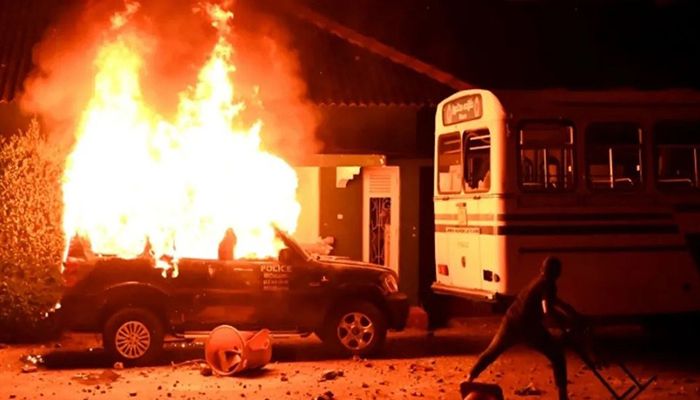
Desk Report
Publish: 01 Apr 2022, 02:08 pm

Photo: Collected
Police in Sri Lanka's capital lifted a curfew on Friday after protests in which around 45 people were arrested and several policemen were hurt near the home of President Gotabaya Rajapaksa over his handling of an economic crisis.
The South Asian nation of 22 million people is facing widespread shortages of essential goods and sharp price rises, weighed down by enormous debt.
On Thursday night, protesters lit tyres on fire to barricade a main road into the capital.
Hundreds of people, rallied by unidentified social media activists, marched on Rajapaksa's home demanding his resignation, setting two military buses and a police jeep ablaze and using bricks to attack officers.
Security forces fired into the crowd and used tear gas and water cannon to disperse the demonstrators. It was not immediately clear if they used live rounds or rubber bullets.
Rajapaksa was not at home during the melee, according to official sources, but top military officials went into a huddle to discuss the crisis.
A live broadcast of the demonstration by a private television network abruptly stopped after what journalists said was pressure from the government.
However, videos shared on social media showed men and women shouting "lunatic, lunatic go home" and demanding that all members of the powerful Rajapaksa family step down.
The president's elder brother Mahinda serves as prime minister while the youngest -- Basil -- holds the finance portfolio. The eldest brother Chamal is agriculture minister while nephew Namal holds the cabinet post for sports.
Sri Lanka's predicament has been driven by the Covid-19 pandemic, which torpedoed tourism and remittances.
Many economists also say it has been exacerbated by government mismanagement and years of accumulated borrowing.
Colombo imposed a broad import ban in March 2020 in a bid to save foreign currency needed to service its $51 billion in foreign debt.
- Out of fuel -
Diesel shortages had sparked outrage across Sri Lanka in recent days, but the protests had been in various towns and not aimed at any top leader.
But on Thursday diesel was unavailable at stations across the island, according to officials and media reports.
The state electricity monopoly said it had enforced a 13-hour power cut from Thursday -- the longest ever -- because it did not have diesel for generators.
Public transport is crippled, as diesel is the main fuel used for buses and commercial vehicles.
"We are siphoning off fuel from buses that are in the garage for repairs and using that diesel to operate serviceable vehicles," Transport Minister Dilum Amunugama said.
Reservoirs, which provide more than a third of electricity demand via hydropower plants, were also at dangerously low levels, reports AFP.
Several state-run hospitals have stopped conducting surgeries as they have run out of essential life-saving medicines.
The government has said it is seeking a bailout from the International Monetary Fund while asking for more loans from India and China.
IMF spokesman Gerry Rice told reporters in Washington on Thursday that such talks should begin "in the coming days", with Sri Lanka's finance minister expected in the US capital.
Subscribe Shampratik Deshkal Youtube Channel
© 2024 Shampratik Deshkal All Rights Reserved. Design & Developed By Root Soft Bangladesh